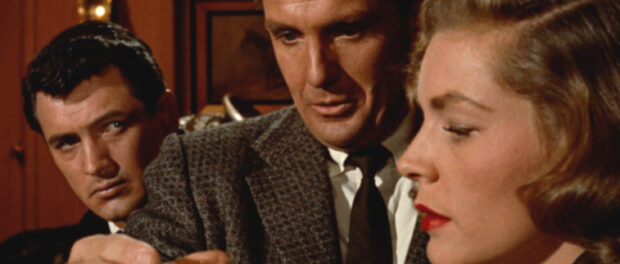Written on the Wind (1956)
[7]
Lauren Bacall finds herself in a love triangle with two best friends played by Rock Hudson and Robert Stack. She marries Stack, the rich playboy, while Hudson continues pining for her. After moving into the family home, Stack’s sister (Dorothy Malone), the town slut, tries to drive a wedge between them and blackmail Hudson into marrying her. Add to this storyline a heap of jealousy, alcoholism, a little impotence, and the availability of firearms, and ‘voila!’ — the modern soap opera is born.
Written on the Wind is an odd film, loved by audiences and hated by critics when it was released in the ’50s. Fans embraced its pulp novel trashiness while critics found it too indulgent. But in later years, the film was rediscovered and re-analyzed, with many concluding that director Douglas Sirk was intentionally sending up American life in the moment, and the film should be interpreted ironically. The film’s style certainly suggests as much, with its swelling score, noticeably phoney sets, and frequent — but somehow appropriate — overacting. Maybe America’s capitalist utopia isn’t so perfect after all?
It wouldn’t matter if irony was Sirk’s intention if Written on the Wind didn’t first work as melodrama. And it does. The aesthetic and tone of the piece is heightened in such a way to ease our suspension of disbelief at the cascading obstacles that befall its characters. The audience identifies with Bacall early in the film, first impressed by Stack’s great fortune — his ability to fly her and Hudson down the coastline for dinner and to provide her with an impromptu hotel room full of luxurious clothes and jewelry. But she rejects him many times before, and she rejects him again after. It’s as if the screenplay is asking the audience, ‘Do you really want to do this? Cuz, it’s a lot.’ And the audience (that enjoys the movie) responds, ‘Well, we’re here. Show us what you got.’
Bacall is great in the film, as always, but Hudson is even better. His quiet, grounded reactions and reserved behavior beg our participation in the story. Stack and Malone are acrobatic in comparison, drinking, fighting, yelling, and between the two of them, spurring the dangerous plot forward. With such volatile roles, it’s no wonder both actors earned Oscar nominations (and Malone won). It’s a weird ensemble that succeeds in selling the material just as much as Sirk’s stylization. As for the irony and intellectual analysis? Sometimes that stuff matters to me — sometimes it even makes the movie. But for Written on the Wind, the trash is enough.
With Robert Keith and Grant Williams (The Incredible Shrinking Man).
Academy Award: Best Supporting Actress (Dorothy Malone)
Oscar Nominations: Best Supporting Actor (Robert Stack), Song (“Written on the Wind”)


